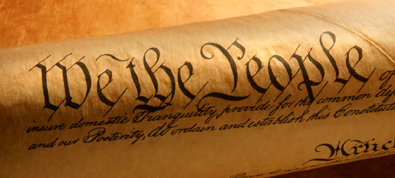Web 2.0 Bill of Rights: free content, users control, Websites are public goods

The Bill of Rights has NOT been amended to reflect Web 2.0 conventional wisdom that:
1) content owners have no right to compensation,
2) non-paying users of commercial services control decision making at the services,
3) Web 2.0 properties are public goods, not private enterprises, and exist as Web 2.0 “philanthropies” to provide free content and services to the Web 2.0 “community.”

This week two financially savvy CEO powerhouses, Doug Morris of Universal Music Group (UMG) and Peter Chernin of News Corp., let it be known publicly that the Web 2.0 free ride is coming to an end. Morris and Doug participated in the Merrill Lynch Media & Entertainment Conference earlier this week and their comments have been widely reported.
Morris is not satisfied with a 1980’s MTV style sweet deal of free content provisioning in exchange for intangible “exposure.” UMG is determined, this go around, to get the tangible “tens of millions of dollars” it is legally entitled to for use of the content it owns:
The poster child for this was MTV. Twenty-five years ago, they built a multibillion-dollar company on our software. They received the software for virtually nothing. We learned a hard lesson.
Recently, companies like Yahoo! and AOL started video on demand running ads between our videos. We asked for payment; they said no. We took down our videos and they said yes. Now we share in their advertising revenue.
Why does YouTube continue to enable the uploading and hosting of unauthorized content? If Yahoo and AOL are respecting their legal obligation to compensate content owners, why can’t YouTube? YouTube might even be acquired by Yahoo or AOL, what would happen then?
Chernin is also frustrated that YouTube is gaining more than it is giving:
If you look at virtually any Web 2.0 application, whether its YouTube, whether it’s Flicker, whether it’s Photobucket or any of the next-generation Web applications, almost all of them are really driven off the back of MySpace. There’s no reason why we can’t build a parallel business…
Given that most of their traffic comes from us, if we build adequate, if not superior, competitors, I think we ought to be able to match them, if not exceed them.
Rather than being applauded for sound and competitive business practices, however, the execs and the companies they lead are being labeled “fuddy-duddies” and derided, often in a very graphic fashion.
These dimwits just don’t get it: YouTube and MySpace and blogs and the internet are their new distribution and sales channels. Want to cut off your noses to spite your faces? Fine. Here’s the knife.
This is your audience you want to attack, fool. They are marketing and distributing your music for you. Don’t want them to? Fine. Plenty more where you came from.
Morris also went after MySpace. And MySpace’s owner, Fox’s Peter Chernin, went after YouTube as well, arguing that MySpace sends traffic to YouTube and so MySpace should hold YouTube by the balls.
Fool, it’s not YouTube that’s doing this. It’s not MySpace that’s doing this. It’s the people. You don’t control these services; they do. And if you try to control them, they’ll show you who’s holding whom by the balls. They’ve leave. You’ll be left holding the ball and not much else.
YouTube is distributing UMG’s music, but it is doing it free of charge, without authorization and without financial benefit to UMG. Moreover, YouTube is using UMG’s content to further its commercial objectives without compensating the content owner for its use.
MySpace users in control? They’ll leave? To where, to do what? The MySpace “balls” are costly; News Corp. supports MySpace operations to the tune of tens of millions of dollars annually. Will MySpace’s 100 million human, animal and product “friends” pool their resources and start-up their own space?
Perhaps they’ll just do what their educated Facebook brethren did in face of service changes imposed upon them by those who do control Facebook (CEO Zuckerberg and his VCs): effortless, inconsequential turnkey online “protest petitions.”
ALSO SEE:
YouTube, MySpace at risk: UMG seeks millions of dollars from 'copyright infringers'
MySpace and its 100 million unfriendly problems
Students to Facebook: More turnkey online 'protest petitions'?
Facebook to students: Zuckerberg and VCs are in control
Web 2.0 'users in control': Of who, and to what means?
Facebook 'activism': how about a greater good?
Homework for Facebook students: hack your own social network!